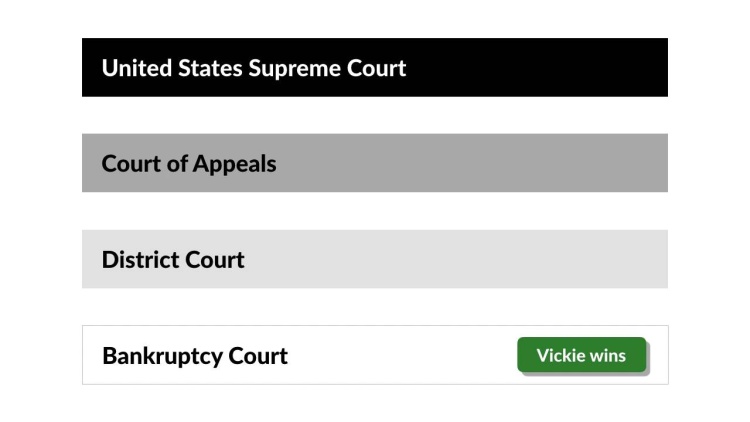Stern v. Marshall
United States Supreme Court
564 U.S. 462 (2011)

- Written by Sean Carroll, JD
Facts
Vickie Lynn Marshall (defendant) sued Pierce Marshall (plaintiff) in a Texas probate court, alleging that Pierce had fraudulently induced his father and Vickie’s husband, J. Howard Marshall, to leave Vickie out of his will. Pierce was ultimately successful in that suit, but not before Vickie filed a bankruptcy petition in California. Pierce filed a proof of claim in the bankruptcy court, alleging that Vickie had defamed him and seeking a declaration that the defamation claim was nondischargeable. Vickie counterclaimed that Pierce had tortiously interfered with J. Howard’s intended gift to her. The bankruptcy court decided in favor of Vickie. The district court ruled upon Pierce’s appeal after entry of the Texas judgment for Pierce. The court concluded that Vickie’s counterclaim was not a “core proceeding” subject to adjudication by the bankruptcy court. Rather than give effect to the Texas judgment, however, the district court reviewed the case on the merits and ultimately awarded Vickie more than $88 million in damages. The United States Court of Appeals for the Ninth Circuit reversed on a different ground. After granting certiorari, the Supreme Court reversed and remanded. On remand, the Ninth Circuit concluded that Vickie’s counterclaim was not a core proceeding and that the district court should have given preclusive effect to the Texas state-court judgment. Vickie filed a petition for certiorari.
Rule of Law
Issue
Holding and Reasoning (Roberts, C.J.)
Concurrence (Scalia, J.)
Dissent (Breyer, J.)
What to do next…
Here's why 905,000 law students have relied on our case briefs:
- Written by law professors and practitioners, not other law students. 47,100 briefs, keyed to 995 casebooks. Top-notch customer support.
- The right amount of information, includes the facts, issues, rule of law, holding and reasoning, and any concurrences and dissents.
- Access in your classes, works on your mobile and tablet. Massive library of related video lessons and high quality multiple-choice questions.
- Easy to use, uniform format for every case brief. Written in plain English, not in legalese. Our briefs summarize and simplify; they don’t just repeat the court’s language.





